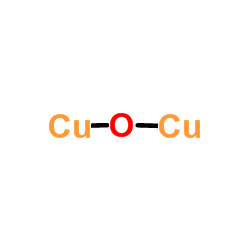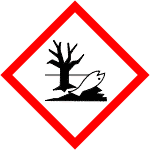Cuprous oxide

Cuprous oxide structure
|
Common Name | Cuprous oxide | ||
|---|---|---|---|---|
| CAS Number | 1317-39-1 | Molecular Weight | 143.091 | |
| Density | 6 g/mL at 25 °C(lit.) | Boiling Point | 1800 °C | |
| Molecular Formula | Cu2O | Melting Point | 1232 °C | |
| MSDS | Chinese USA | Flash Point | 1800°C | |
| Symbol |


GHS07, GHS09 |
Signal Word | Warning | |
|
Zinc supplementation sustained normative neurodevelopment in a randomized, controlled trial of Peruvian infants aged 6-18 months.
J. Nutr. 144(8) , 1298-305, (2014) A double-blind, randomized clinical trial was conducted to determine the effects of prevention of zinc deficiency on cognitive and sensorimotor development during infancy. At 6 mo of age, infants were randomly assigned to be administered a daily liquid supple... |
|
|
Interplay between autophagy and apoptosis mediated by copper oxide nanoparticles in human breast cancer cells MCF7.
Biochim. Biophys. Acta 1840(1) , 1-9, (2014) Metal oxide nanoparticles are well known to generate oxidative stress and deregulate normal cellular activities. Among these, transition metals copper oxide nanoparticles (CuO NPs) are more compelling than others and able to modulate different cellular respon... |
|
|
The induction of biochemical changes in Daphnia magna by CuO and ZnO nanoparticles.
Aquat. Toxicol. 150 , 201-9, (2014) Whilst a considerable number of studies have been reported on the acute toxicity of nanoparticles (NPs) on invertebrates such as Daphnia magna, few studies have been reported on the biochemical change (biomarkers) induction on these species by NPs, especially... |
|
|
Degradation of some typical pharmaceuticals and personal care products with copper-plating iron doped Cu2O under visible light irradiation.
J. Environ. Sci. (China) 24(5) , 827-33, (2012) A mixture of five commonly used pharmaceuticals and personal care products (PPCPs) was degraded using a new combined catalyst under visible light irradiation. Scanning electron microscopy and X-ray diffraction analysis revealed that the combined catalyst was ... |
|
|
An experimental study for enhancing the catalytic effects of various copper forms on the oxidation of ferrous iron.
Environ. Technol. 34(1-4) , 1-6, (2013) In this research the catalytic effect of copper compounds (ionic, oxide and oxide nanopowder) on the oxidation of ferrous iron by aeration was studied experimentally. When copper exists in solution, the oxidation rate of iron(II) will increase. The experiment... |
|
|
Reduction of facial wrinkles depth by sleeping on copper oxide-containing pillowcases: a double blind, placebo controlled, parallel, randomized clinical study.
J. Cosmet. Dermatol. 11(3) , 193-200, (2012) Copper up-regulates the secretion of extracellular skin proteins and stabilizes the extracellular matrix once formed. As copper can be absorbed through intact skin, we reasoned that sleeping on pillowcases containing copper-impregnated fibers would reduce ski... |
|
|
Size-controlled preparation of Cu2O nanoparticles from waste printed circuit boards by supercritical water combined with electrokinetic process.
J. Hazard. Mater. 233-234 , 200-6, (2012) In this work, an effective and size-controlled process for preparing Cu(2)O nanomaterials from waste PCBs by supercritical water (SCW) combined with electrokinetic (EK) technique was developed. SCW was used for the pretreatment of waste PCBs, and highly unifo... |
|
|
Nanocrystal Cu2O-loaded TiO2 nanotube array films as high-performance visible-light bactericidal photocatalyst.
Appl. Microbiol. Biotechnol. 96(5) , 1201-7, (2012) In this work, we report the use of a non-toxic nanocrystal Cu(2)O-loaded TiO(2) nanotube array (Cu(2)O/TNTs) film as high-performance visible-light bactericidal photocatalyst. The samples were characterized by field-emission scanning electron microscopy, X-ra... |
|
|
Bienzyme-functionalized monodispersed biocompatible cuprous oxide/chitosan nanocomposite platform for biomedical application.
J. Phys. Chem. B 117(1) , 141-52, (2013) The ultrafine monodispersed cuprous oxide (Ufm-Cu(2)O) nanoparticles have been successfully synthesized by a facile wet chemical method using poly-N-vinylpyrrolidone (PVP) as a capping agent. This colloidal solution of Ufm-Cu(2)O and chitosan (CS) is electrop... |
|
|
Copper oxide nanoparticles can induce toxicity to the freshwater shredder Allogamus ligonifer.
Chemosphere 89(9) , 1142-50, (2012) Increased commercialisation of nanometal-based products augments the possibility of their deposition into aquatic ecosystems; this, in turn, may pose risks to aquatic biota and associated ecological functions. Freshwater invertebrate shredders mostly use micr... |